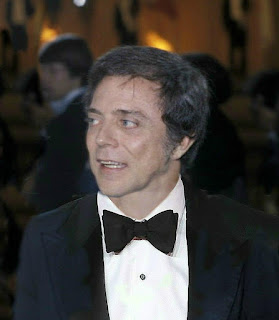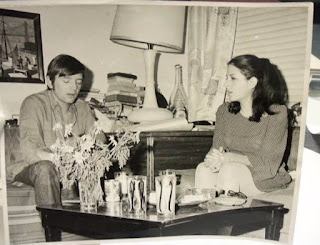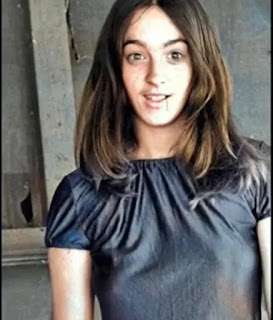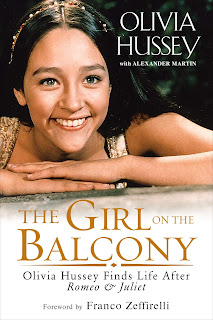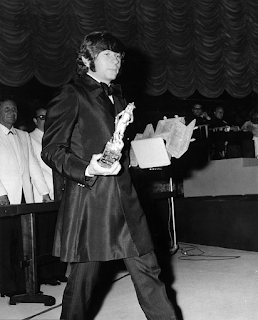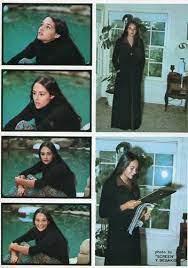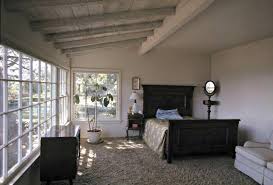Little appears to be known about Cielo from the time Altobelli purchased the property, to, say, when Terry Melcher moved in, renting the main house beginning on May 15, 1966, along with Mark Lindsay of Paul Revere and the Raiders. This all changes, of course, with the introduction of Charles Manson and Tex Watson into the story.
Yet there is certainly a subset of this time, all but forgotten, if it were not for a few passages of witness testimony at the trials. To be sure, many witnesses contributed to this aspect of the story (the backstory), but this post will focus on a select few of these. These are parts of the story which are background, apocryphal. According to his mother, William Garretson left his hometown of Lancaster Ohio in October 1968, hitching out to Los Angeles. It took Bill and a companion only a couple of rides to make it to California, and with not much more than change in their pockets.
William Garretson enters the story of Cielo in a rather strange way: he all but materializes suddenly into the narrative. Bill early on conveyed to his attorney, Barry Tarlow, that he encountered his future employer, Altobelli, while hitchhiking in Hollywood. Bill later confirms the same to LT. A.H. Burdick of the LAPD at Parker Center, along with everything else he was asked about Cielo.
W.E. Garretson in conversation with B.G. Tarlow
LT. Burdick interviewed Garretson on Sunday August 10, 1969:
Q How did you come upon that job?
\
A Well, I met Mr. Altobelli on--in Hollywood. And he, you know, he wanted--he's just got back from Europe, and he let some woman stay there before[in the guest house]that he knew for twenty years, and, you know, she partied every night and everything and the place was torn up and he--and just, you know, he told me if I wanted a job, I could come up and clean his house, and I was going to go back to Ohio in March, and I was picked up for Possession of Marijuana, and it was lowered to Visitation. And so, you know, after that I was going to go back to Ohio, but he was going to Europe and he wanted to--he said the dogs liked me and everything, and he wanted to know if I would stay on while he went to Europe, then he would be back, you know, and he asked me, you know, he'd give me an airplane ticket home and everything.
Q Who was the woman who had your job before?
A Edith Stoltan(phonetic).
From this exchange we learn the most famous caretaker at Cielo had a predecessor, a certain Edith Stoltan. I could find no information on her, but apparently, she was a long-time friend of Altobelli, and equally, it would seem, as trustworthy as young Bill.
Again, Garretson:
Q But she lived in this house on--
A --when he went to Europe before.
Q On Cielo before?
A Yeah.
Q And she partied every night and he didn't like this?
A Well, that's from what I hear, you know, the place was a mess when I got there and everything.
Q What place was a mess?
A The guest house.
Q The guest house?
A Yes. She was taking care of the dogs and the bird. The bird died and everything...
(Tape Recorded Polygraph Examination of William Eston Garretson. Tape #32116. August 10, 1969 1625 hours.)
Guest house at Cielo, view of front door towards kitchen and bathroom. Notice the phone with the long extension cord on the table, along with the Budweiser beer cans.
During the trial, Rudy Altobelli, on the stand, corroborates Bill's story to LT. Burdick, and adds some detail. One detail that I find most interesting is the following exchange with Ron Hughes:
Q Now, did you know Mr. Garretson prior to your hiring him?
A No.
Q You just met him that day?
A No, I did not.
Q Well, he wasn't a friend, though?
A No.
Q How much previous to hiring him had you met him?
A He had been hired way before that, when I first came back from Rome. I came back because of the heavy rains and I needed somebody to clean up some things, and Mr. Garretson was hired by me, and he seemed to be very nice and he loved the animals and the animals loved him. He seemed to be ideal to leave my dogs with. He seemed to be trustworthy.
(p. 14,781 Manson, et al trial testimony. Courtesy Cielodrive.com).
Q When you left for Europe in March did you know that Voityck Frykowski and Abigail Folger were going to live in the house in Sharon's and Roman's absence?
A I was told they were going to stay there, yes.
Q Did you know that they were going to entertain while they were there?
A No, that was not a question.
Q Did you know they were going to have large parties?
A No--
Mr. Bugliosi: That is assuming a fact not in evidence, your Honor.
The Court: Sustained.
(p. 14,795 Manson, et al trial testimony. Courtesy Cielodrive.com).
Apparently the winter of December 1968 into early 1969 produced some very heavy rains and damaging floods in the L.A. area. No doubt this caused some storm damage at Cielo, and Bill Garretson was hired to help clean up the property (or was it just the guest house?), "way before" assuming the official caretaker duties at the guest house on March 24, 1969. It could have conceivably been in late 1968, during the heavy rains, but obviously before Rudy and Sharon Tate made their trip to Europe on March 24. Rudy hired Bill because he was "trustworthy". He had to have known Bill long enough and well enough to come to that conclusion. After all, Rudy had known Edith Stoltan for twenty years.
Rudy Altobelli
Hughes continues:
Q How long to Abigail Folger and Voityck Frykowski moving into the main house had you met them?
A I had met them at the party, I guess I was introduced to them at the house the day before. [March 23, 1969. The day before Altobelli and Sharon Tate left for Europe together]. It was very casual. I never had any conversation except for Abigail once, by telephone from London, when we were waiting for the plane to Rome, I was concerned about the boy in the back, and Sharon said I should call Abigail because she was a social worker and she could keep an eye on him and get him on the right path.
(p. 14,798).
Abigail Folger and Voytek Frykowski. Was Abigail keeping an eye on Bill Garretson?
At the trial, defense attorney Shinn cross examined William Garretson:
Q Have you ever been inside the Tate residence?
A Yes.
Q How many times?
A Twice.
Q What was the occasion?
A Well, before Mrs. Polanski, you know, moved in to, you know, the main house, I was there. I mean, you know, that was before anybody moved in.
Q Was this the first time you entered the house?
A And I was invited over another time.
Q Invited for what? For a party? For a dinner?
A No. That was when Abigail and Frykowski were staying there. They invited me over.
Q And how long did you stay?
A Five to ten minutes.
Q Did you have anything to eat or drink at that time?
A Just a beer.
Q One beer?
A Yes.
(p. 4,635).
Hughes continues:
Q And Christopher could that evening get out from the guest house on to the back patio, the double doors, as you indicated; is that correct?
A He could have gotten out. He could have been gone and I wouldn't have known about it.
Q And there was nothing to keep him, then, once out in the back patio from going around in front of the guest house up to the large residence; is that correct?
A Yes.
(p. 4706).
William Garretson waiting to be called to testify at Manson trial
Backyard of guest house at Cielo. Is this what Garretson referred to as the "little place"?
Bugliosi & Garretson:
Q The three dogs that you took care of for Mr. Altobelli, where were they that night?
A They were staying with me in the living room.
Q Did they leave the house at all during the night or did they stay with you the entire night?
A Yes, I had the back door open on the patio by the stereo.
Q Did they leave during the night or did they stay with you inside the living room?
A Well, the Weimaraner left. The larger dog.
(p. 4,636).
Cielo guest house. View from front door towards stereo
If Edith Stoltan liked to party in the guest house, Bill kept it rather respectable by comparison. But this did not stop Bill from entertaining guests while in residence. To be sure, Bill Garretson became lonely, and did what lonely people do: he reached out for companionship. These companions included, principally, Darrell Kistler and Roy Plank, both of whom were from Bill's native Ohio.
Students of this case will remember Kistler and Plank from Bill's recorded polygraph examination. They both factor significantly, and were of keen interest to LT. Burdick. Bill volunteered that he asked Kistler, who just returned from Vietnam, to live with him in the guest house in late May. He lived with Bill for about a month. This came to an abrupt end in late June when Bill threw Kistler out for stealing bottles of champagne from the main house. How Kistler accomplished this is unknown, but it happened on more than one occasion. Undoubtedly this was champagne that was delivered to Cielo, and perhaps left outside by the front door, or at the service porch area in the rear. It should be remembered that Billy Doyle loved champagne, and Abigail Folger did give champagne as a gift, at least to Witold-K for his birthday, which was in May).
Roy Plank high school yearbook photo, fourth row, last picture
I could find no photos of Kistler anywhere on the internet, and no yearbooks that I was able to locate had a photo of him in them, either. The same can be said for Patricia Montgomery, although her name appears in lists of graduating students of Indio High, at places like Classlists.com. The girls did not live at Cielo, but had occasionally stayed overnight, according to Bill Garretson. When Bill kicked Kistler out, the girls left with him, returning to Indio. LT. Burdick asked Bill if both girls were from Indio, and Bill replied, "[Y]es, both the girls." Apparently it was Debbie Tidwell that Bill favored.
Debbie Tidwell yearbook photo
Another visitor to the Cielo guest house, according to Bill Garretson's interview with LAPD, was Roy Plank. Roy and Bill were classmates in high school back in Lancaster Ohio. Plank was a Marine stationed at Camp Pendleton, who ultimately went A.W.O.L. and wound up being apprehended in Lancaster. Very little is known of the whereabouts of Plank and Kistler immediately following the murders of August 1969, but I was able to locate some newspaper clippings. This from the Indio Desert Sun:
"Driver Has Repeating Accidents"
"Indio--An accident looking for a place to happen happened twice Wednesday night, in Palm Desert, and between Palm Desert and Indio. Booked at the Indio Sheriff's Sub-Station on a charge of driving under the influence of alcohol after the accidents was Darrell Kistler, 23, of 80-521 Highway 111, Indio, a California Highway Patrolman said.
The first accident occurred at 9:45p.m. at the Security Pacific National Bank at 74-011 Highway 111 in Palm Desert. According to the CHP officer, Kistler, driving a panel truck, attempted to drive into the bank parking lot, missed the driveway, knocked over an entrance sign, backed up into the bank wall and also broke off a sprinkler...
At 11:30p.m., on Highway 1121, 1300 feet west of Dune Palms Road, the panel truck, driven eastbound by Kistler, crashed into the rear of another eastbound vehicle driven by John Bailey, 48...Taken to Indio Community Hospital and treated for minor injuries and released after the crash were Kistler and two passengers in the Bailey vehicle..."(Desert Sun, Volume 44, Number 229, 29 April 1971).
Darrell Kistler obituary notice from the Lancaster Eagle Gazette in the 1980's. Unfortunately he died a young man.
Roy Plank died in 2014 in Lancaster Ohio while mowing the grass. Apparently he had a heart attack.(Lancaster Eagle Gazette, August 11, 2014). I did manage to locate Debbie Tidwell on social media, and reached out to her, asking if she would care to comment on the summer of '69 at the guest house on Cielo. I have not received a reply from her.
Other regular visitors to the guest house were brothers Tom and Dave Vargas, gardeners employed by Rudy Altobelli since about 1965 at Cielo. The brothers tended to the Cielo property twice a week professionally, and when they were not working there, they used the guest house, shall we say, recreationally. According to Garretson, it was Tom Vargas who visited the guest house Thursday night, August 7, 1969. Accompanying Tom that evening was his girlfriend. Tom bought Bill the now famous Budweiser beers that--along with a couple of joints and a Dexedrine capsule--got poor Bill rather sick, causing him to feel somewhat fragile Friday August 8th.
Tom Vargas, like his brother Dave, were married men. Dave, it appears, brought his girlfriend to Cielo, but parked outside the gate to the property for their fooling--around sessions. This would probably have been in about the same place where Tex Watson would park the car on Friday August 8th when he cut the phone lines to Cielo.
LT. Burdick continued to question Bill Garretson:
Q What have you seen going on there that is different?
A I never seen--well, that night?
Q Any time?
A Oh, maybe one time I seen that--I don't know, I--I was asleep and I woke up, and that was when Darrell was living there and those two girls were staying that night, and they were over in the pool swimming and I went over there and they said that they'd seen Polk (phonetic)--Sharon wasn't there yet, I don't think, on mescaline--that somebody was on mescaline or something.
Q I didn't hear you.
A Somebody was on mescaline or something that lived in the main house. That was what they told me.
Q How would they know this?
A They said that they told 'em.
Q They told them? What do you mean?
A They told them that they were on mescaline or something.
Q Someone that was in the main house told the two girls that were visiting you that?
A Yeah, yeah, and that they were on mescaline or something--I don't know.
***
Q How many times have you been in that big house, the main house?
A I think about twice.
Q When was the last time?
A That's when they asked me over one time. Abigail and the young Polanski. And they asked me--they asked me up. Abigail called me up and asked if I didn't have to go to court the next day for a (*) Possession of Marijuana charge which they lowered to Visitation. They wanted to talk to me, and that was the last time I was there.
Q They wanted to talk to you?
A Yes.
Q About what?
A About going to court.
Q What did they tell you?
A Well, it seemed like they were really concerned, you know, because Mr. Altobelli left and she, you know, he left with Mrs. Polanski, and she seemed a little bit concerned, you know, what was going to happen, if I was going to get, you know, a probation or whatever. You know, we discussed it. That was the last time I was there.
Q Did they offer you any narcotics?
A No.
Q Did they ask whether you could get some information for them? Or could you get some from them?
A They offered me a beer when I was there.
Q Offered you a beer?
A Yeah, or a glass of milk.
Q That was how long ago?
A Let's see, that was in March--middle of March.
Rudy Altobelli further contributes to the story of Cielo by filling in more gaps, and by expanding upon the association between Abigail and Bill while occupying the property. To me at least, Rudy placed an enormous amount of trust in both Bill and Abigail while they lived at Cielo. According to Altobelli's testimony, he met Abigail and Voytek for the first time on the day before he and Sharon left for Europe. Within a week Abigail and Voytek would be fully moved into the main house, while they invited friend and artist Witold-K to occupy their rented house at 2774 Woodstock in Laurel Canyon.
Altobelli, however, was concerned about Bill living in the guest house on his own, so Sharon suggested that Abigail keep an eye on him as she was a social worker. The ultimate extent to which she and Bill had contact is unknown, but through testimony we learn that Abigail and Voytek did offer Bill rides down to Sunset, and possibly back up to Cielo. Bill claimed that he was never invited to any gatherings at the main house, probably in an effort by Abigail to distance him from outside influences? Obviously Abigail and Voytek knew about Bill being charged with possession of marijuana, and were at least concerned about it.
Thus far, the story of Cielo, after Rudy Altobelli moved into it, may appear to be idyllic. We may imagine lazy summer days and evenings by the pool; famous and beautiful people coming and going; the gardeners performing their work; housekeepers keeping house; neighbors visiting. Everyone involved with these vignettes could, and in many cases did, contribute to this story: Samantha Eggar, Terry Melcher, Candice Bergen, Mark Lindsay, Witold-K, Billy Doyle, Debra Tate, Maureen Serot, Seymour Kott, Winifred Chapman, Tom and Dave Vargas.
Had this gone on uninterrupted, the world may have never heard about 10050 Cielo Drive. That is, of course, until Susan Atkins took over as a storyteller, and essentially created the official narrative of Cielo Drive for all time.
Susan Atkins, author of the master narrative
Unknown to Bill Garretson during the night of August 8, 1969, was that both his story and duties at Cielo Drive would fade, only to be usurped by the story Atkins would weave, literally while he wrote letters and listened to the music of the Doors and Cass Elliot. On that night, as the crickets chirped, the inflatables nudged each other in the pool, and the wind chime hanging by the front door gently sounded its song, the first word of Atkins' enduring narrative would be scrawled in blood on the front door. And perhaps, just perhaps, Patricia Krenwinkel became the last visitor to the guest house, attempting to gain entrance, but failing. It is in this failure that the transference of the story from Bill Garretson to Susan Atkins is solidified: Bill Garretson indeed lived to tell his part of the story, but the story of Susan Atkins would eclipse it, becoming the story of the "crime of the century".
Linda Kasabian would confirm and amplify the master narrative
THE INTERSTITIAL PERIOD:
After the murders at Cielo, and with the conclusion of the immediate first week of the investigation, is a part of the story that I call, the interstitial period. It is a time of the continuing story, extending into the early '70s, but with several new storytellers. One of these is actress Olivia Hussey, star of the film, Romeo and Juliet in 1968, and directed by Franco Zeffirelli.
Ms. Hussey enters the pre-murder Cielo story as a footnote. In her autobiography, Olivia details how she factored into Cielo Drive, by meeting with Rudy Altobelli and the actor Christopher Jones.
Olivia Hussey autobiography book cover
It begins with Olivia, who was living in London in 1969, received a call from Rudy Altobelli. Both he and Stuart Cohen were managing young actor Christopher Jones, and Jones prevailed upon Altobelli to call Olivia, inviting her to dinner. Olivia and Christopher apparently got on well together, and before long, she was visiting him on the set of his latest movie, Ryan's Daughter.
Christopher Jones and Olivia Hussey
Olivia developed a relationship with Jones, and became very close to Altobelli as well. Soon enough, Rudy asked Olivia if he could manage her career. Olivia acquiesced, and thus began the professional and personal friendship with Altobelli that would ultimately bring her to 10050 Cielo Drive. Shortly thereafter, Olivia received word that she was to be a recipient of the Donatello award for best actor of the year(rather like the Oscar)in Italy. Before leaving, Rudy made a phone call to California, and spoke to Sharon Tate, who along with Roman Polanski had rented the Cielo main house that spring. The Donatello award ceremony was held on August 2, 1969. Olivia spoke to Sharon the day before, on August 1st, a mere week before Sharon's death.
Rudy then handed the phone to Olivia, and as she described it, Rudy said, "Olivia, I want you to say hello to a lovely woman who's looking forward to meeting you. Her husband is the director Roman Polanski. Her name is Sharon Tate." She went on to say, "Sharon Tate sounded warm and friendly. She told me that she adored me in Romeo & Juliet and that I must come out to LA so I could meet her, Roman, and their new baby, who was expected any day."(Olivia Hussey, The Girl On the Balcony. Kensington Publishing Group, 2018. p. 106).
After the Donatello award ceremony, Rudy introduced Olivia to Roman Polanski, who also received an award. Olivia recalled, [H]e talked about Sharon and moving to Los Angeles, he talked about how beautiful Rudy's home was and how I must come and see it if I ever found myself in LA. As I left that night, I thought how nice it would be to spend time with this couple."(Hussey, p. 107).
Roman Polanski receiving his Donatello award, August 2, 1969
Later, the relationship between Olivia and Christopher Jones began to take a dark turn. Jones was obviously significantly mentally ill, brooding, and sometimes violent. Rudy tried to help, but to no avail. After Jones' film wrapped, Olivia called their relationship a wrap--she had had enough. To be sure, during the filming of Jones' movie, while he spoke to Oliva alone one night, he punched her violently in the abdomen. But while still involved with Jones, Olivia began a friendship with Dino Martin, son of legendary film actor Dean Martin. Dino himself would ultimately enter the story of Cielo, dating and later marrying Olivia Hussey.
Altobelli convinced Olivia to move to L.A. and she agreed. But she had one problem: she had nowhere to live. To Rudy, this was no problem at all, and he offered her the bedroom at Cielo in which Abigail and Voytek had been staying. She would move in during September 1969. But five weeks before moving into the main house, the murders took place. As Olivia claims, "Rudy was still in Italy when he received the call with the news...I didn't know Sharon, having only spoken to her on the phone that one time. I did know Rudy, and I saw how much it affected him: He had known Sharon. The crime was vicious and senseless, and it happened in his home. Which would be my home for the next four years. Let me say simply that the whole time I lived at Cielo Drive there was nothing strange or macabre about it. I was still very young, and by the time I arrived all traces of the crime had been erased. Certainly something awful had happened there--it was sometimes odd to stand in the living room and look out at the front lawn, knowing that those terrible things had happened right there--but it was not the house's fault. As someone once said, evil does exist, but it is always human."(Hussey, p. 113).
Olivia Hussey poolside at Cielo and in the former bedroom of Abigail and Voytek
Olivia Hussey in 1969
However, the interstitial period was not without its problems for Olivia Hussey. When she moved into Cielo, she was informed by Altobelli that, since he still represented him, and because he had nowhere else to live, Christopher Jones would move into the guest house, just a few weeks after William Garretson vacated it. Jones was instructed by Altobelli to keep his distance from Olivia, and for a while, Jones did just that.
Meantime, Olivia enjoyed her new friendships with the Hollywood elite, including young Dino Martin. She enjoyed Hollywood nightclubs and meeting people who came to Altobelli's parties at Cielo. Olivia said of Altobelli, "Rudy, I was learning, had a malicious streak and a medieval kind of humor: He laughed loudest at others' misfortune or embarrassment. It was not a pleasant quality, but more often than not it was obscured by his flamboyant, circus-act personality."(Hussey, p. 120).
Olivia met Terry Melcher, who according to Tom O'Neill in his book, Chaos, revealed that Terry moved back into Cielo not long after the murders. Terry and Olivia began a "very casual" relationship, but ultimately she found Terry "brooding and moody and always high, and after about a month our relationship fizzled out."(Hussey, p. 121).
Terry Melcher at Manson trial
Olivia lived the good life at Cielo, which included, as she says, smoking weed with Altobelli. And ostensibly, like many in her circle, she was not frightened away because of the murders in August. But evil had not entirely left 10050 Cielo Drive after the murders. One might think that with the rise of the sun on Saturday August 9, 1969, the evil specter of the night before would have vanished, frightened away by the dawn. This was not the case, as Olivia unfortunately soon would learn:
"There was a standing lamp in the corner of my bedroom[Abigail and Voytek's]at Cielo Drive. When the door was pushed open, say by one of Rudy's two dogs, a shadow would slide slowly, like an eclipse, from the ceiling to the floor...One night, I was almost asleep when the shadow began to move across the room. Out of habit I dropped my hand down off the bed and waited for Lady, Rudy's German Shepherd, to find it and snuggle up. This time, though, it wasn't Lady; it was Christopher. And he closed the door behind him. The next five--and--a--half hours were the worst of my life. Christopher was hearing voices. He was twitching. He was so far gone it was shocking.(Hussey, p. 124).
Olivia goes on to detail the terror of the night, describing how Jones beat and then raped her. Jones left the former bedroom of Abigail and Voytek at 5:30AM. "After a while, I managed to get up and walk gingerly into the kitchen, where Rudy took one look at me and started to scream."(Hussey, p. 125). With that, Rudy Altobelli immediately threw Christopher Jones out of Cielo forever.
Long story short, Dino Martin came to Olivia's rescue, and the two fell in love. The rape resulted in a pregnancy, and Olivia decided upon an abortion, as she did not want a child to link her to Jones. In the end, Martin and Olivia were married, and had a child together.
Olivia Hussey and Dino Martin. At Cielo?
The interstitial period saw many people come and go from Cielo Drive, including a certain Robert Conrad(not the actor), an exchange student from Yugoslavia studying design at UCLA. According to Rudy's testimony at the trials, Conrad was hired as a houseboy(probably to assume the duties of the previous caretaker, William Garretson), from February to August 1970.
Bob Esty and Stuart Cohen in the living room of 10050 Cielo Drive, 1970's
Bedroom of Olivia Hussey at 10050 Cielo Drive, formerly occupied by Abigail Folger and Voytek Frykowski
After the early 1970's what I call the interstitial period comes to a conclusion, ending as ambiguously as it started. Of course, many more years of the story of Cielo Drive would follow, with the addition of many now famous storytellers. Sadly, and for reasons unknown to me, Rudy Altobelli decided to sell his beloved house on the hill, in the late 1980's. He purchased the property in 1963 for $86,000, and sold it for $1.6 million. According to Tom O'Neill, both he and Altobelli--who had became friends--visited Cielo one evening after the original house had been demolished, and replaced with the house that presently stands there. It was a melancholy visit. Says Altobelli, "I lived in that house twenty--five years, four months, and thirty--eight hours[.]" O'Neill went on to say that Altobelli wound up living "in a converted garage in a neighborhood known for its gang activity."(Tom O'Neill, Chaos: Charles Manson, the CIA, and the Secret History of the Sixties. Little Brown and Company, 2019. p. 106).
Front yard of 10050 Cielo Drive, October 1, 1969
The house that occupies the former 10050 Cielo Drive property is currently up for sale, for a paltry $85 million, if one felt so inclined. Obliterated are the neat front lawn, manicured hedge and gardens, so treasured by the inhabitants of the original 10050. The utility pole that Tex Watson climbed has been moved to the other side of the road, but one of the original majestic fir trees in the front yard remains, known as the "Abigail Folger Tree," as it stood very near where Abigail died in the front yard of 10050.
I suppose if the hill on which this famous property sits could speak, it too would have a story to tell. We continue to hear about this famous address by Tex Watson and Patricia Krenwinkle at their various parole hearings, essentially parroting the official master narrative of Susan Atkins. But long after the Tex Watsons and Patricia Krenwinkles of our current world depart, we no doubt will not have heard the end of the stories of Cielo Drive. And we never will.



